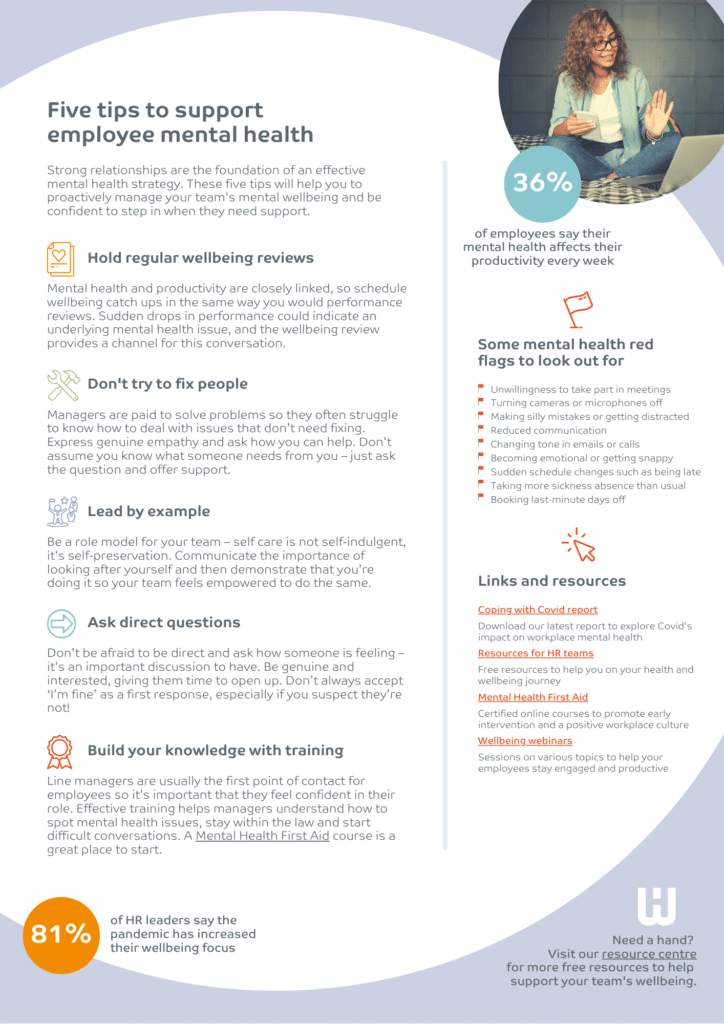Our Coping with Covid report explores the latest research into the mental health impact of the pandemic. The survey of over 1,600 employees and HR leaders found that a third of employees report poor mental wellbeing at their organisation and 24% are looking for extra wellbeing support in the coming months.
With homeworking and social distancing still in place across the country, who is responsible for mental health support, and how can they ensure it’s effective? HR leaders are keen to offer assistance, with 84% saying wellbeing is getting more important, but when it comes to mental health conversations it is managers who know their team the best.
If you’d prefer to watch, you can view the advice shared in this blog in a recording of our latest webinar: Five tips to support your employees’ mental health and spot the signs of presenteeism.
Strong relationships are the foundation of an effective wellbeing strategy
While the HR department is usually responsible for organisational wellbeing strategy and employee engagement, it is line managers who are the ‘first responders’ of mental health support. Those who work most closely with employees are usually best placed to step in and start conversations with individuals.
For many, the Covid-19 pandemic has altered how we interact with our colleagues at a time when they need support the most. As lockdown wears on, our research found that 26% of employees are feeling more anxious about work, but new ways of working can make it more difficult to spot those struggling with stress.
Monthly 1:1s are a great place to ask your people how they’re coping, but informal chats can work well too. You could also build workplace relationships with a virtual coffee break, happy hour or book club. Ask your team what activities they’d enjoy and try to cater to different interests and avoid ‘forced fun’.
Starting a conversation about mental health
A consistent approach will allow you to build trust within your team. While it’s natural to approach the situation delicately, don’t tiptoe around the issue or try to script the conversation.
When approaching mental health topics, it’s best to use your own words, be authentic and keep it simple. If you don’t ask, you’ll never be able to help. Try these open-ended questions to help start the conversation:
- How are you feeling?
- How are you coping with the current situation?
- What support have you got at home?
- What are your upcoming plans?
- What do you need from me?
- What can I do to support you?
Supporting employees with their mental health – top tips for line managers
Cathy Lawson is an independent Workplace Wellbeing Consultant, Trainer and Coach, who leads our Mental Health First Aid courses. Here are her five simple mantras for workplace mental health support.
- Hold regular wellbeing reviewsMental health and productivity are closely linked, so schedule wellbeing catch ups in the same way you would performance reviews. Sudden drops in performance could indicate an underlying mental health issue, and the wellbeing review provides a channel for this conversation.
- Don’t try to fix peopleManagers are paid to solve problems so they often struggle to know how to deal with issues that don’t need fixing. Express genuine empathy and ask how you can help. Don’t assume you know what someone needs from you – just ask the question and offer support.
- Lead by exampleBe a role model for your team – self care is not self-indulgent, it’s self-preservation. Communicate the importance of looking after yourself and then demonstrate that you’re doing it so your team feels empowered to do the same.
- Ask direct questionsDon’t be afraid to be direct and ask how someone is feeling – it’s an important discussion to have. Be genuine and interested, giving them time to open up. Don’t always accept ‘I’m fine’ as a first response, especially if you suspect they’re not!
- Build your knowledge with trainingLine managers are usually the first point of contact for employees so it’s important that they feel confident in their role. Effective training helps managers understand how to spot mental health issues, stay within the law and start difficult conversations. A Mental Health First Aid course is a great place to start.
For an in-depth look our latest research into employee mental health during Covid-19, download our Coping with Covid report. You can also download our quick-reference guide to the tips in this blog to share with your team:
